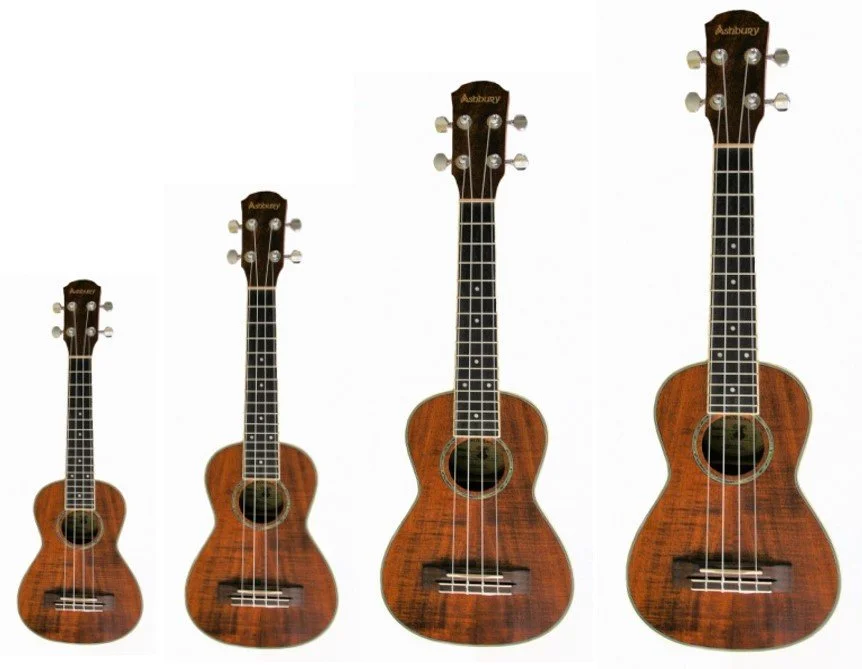BARITONE UKULELE? HERE’S WHAT YOU NEED TO KNOW
If you’ve spent any time strumming your way through the ukulele world, you’ve probably heard whispers (or deep, warm tones) about the baritone ukulele. It’s the biggest member of the uke family - and it’s often misunderstood.
So, what makes the baritone ukulele so special? Why does it sound different from your soprano, concert, or tenor uke? And is it the right instrument for you? Let’s find out everything you need to know about this bold, mellow-voiced beauty.
🎵 What Is a Baritone Ukulele?
The baritone ukulele is the largest of the four main ukulele types. Typically measuring about 30 inches long, it’s a few inches bigger than a tenor uke. That might not sound like much, but those extra inches make a world of difference!
Here’s the key twist:
The baritone is tuned differently from the other ukuleles.
Instead of the standard G–C–E–A tuning, the baritone uses D–G–B–E—the same as the top four strings of a guitar. That means if you’re a guitarist, you’ll feel right at home.
And if you’re already a uke player? You’ll discover a deeper, richer tone that feels a little like slipping into your favorite cozy sweater.
In short:
✅ It’s a ukulele, but with a warmer, deeper tone.
✅ It’s tuned like a guitar, so easy for guitarists to pick up.
✅ It opens up a whole new world of musical possibilities.
🔊 How the Baritone Ukulele Sounds
Imagine the sweetness of a ukulele, but with a warm, resonant depth that fills the room. That’s the baritone.
Because of its larger body and lower tuning, it produces a smooth, mellow tone that sits beautifully between a ukulele and a classical guitar. It’s perfect for fingerpicking, jazz chords, or soulful solo playing.
Want that tropical uke vibe with a little more “grown-up” sound? The baritone is your match.
You’ll notice:
More bass and less “sparkle”
Longer sustain
A smoother, fuller sound
It’s the ideal choice if you love the ukulele’s character but crave a more grounded, mellow vibe.
🎸 Baritone Ukulele Tuning & Chords
Here’s where things get interesting. As mentioned, the baritone’s tuning (D–G–B–E) means chord shapes don’t match the ones you use on other ukes.
For example:
The standard C shape plays a G chord
The F shape plays a C chord
The G shape plays a D chord
If you already play ukulele, it might take a little adjusting. But the trade-off is worth it! You’ll unlock new voicings and tonal textures that smaller ukes simply can’t produce.
And if you play guitar? You’re already fluent in baritone tuning!
The baritone’s tuning (D–G–B–E) mirrors the top four strings of a guitar.
That means:
Guitar players can jump in instantly - no retuning or transposing needed.
Ukulele players will need to adjust chord shapes a bit, since, as mentioned, C, F, and G shapes produce different chords on a baritone.
It takes a little practice, but your muscle memory will catch up faster than you think!
🎶 Why Choose a Baritone Ukulele?
So, why go baritone when there are so many other ukuleles out there? Here are some reasons players fall in love with this versatile instrument:
1. It’s Perfect for Guitarists
Since it shares the same top-four-string tuning, transitioning from guitar to baritone uke feels effortless.
2. It Has a Richer, Deeper Tone
The baritone’s low register adds balance to ensembles and creates a fuller sound when played solo.
3. It’s Great for Vocal Accompaniment
Singers love baritones for their mellow tone that doesn’t overpower the voice.
4. It Expands Your Ukulele Range
Already own a soprano, concert, or tenor? The baritone completes your collection by adding sonic depth to ensembles or recordings featuring multiple ukes.
Whether you’re performing solo or jamming with friends, a baritone rounds out the sound beautifully.
🪶 Choosing the Right Baritone Ukulele
When shopping for a baritone uke, look for quality tone woods, build and comfort.
Popular choices include:
Mahogany – warm, balanced, classic ukulele sound
Spruce – bright and responsive with strong projection
Koa – traditional Hawaiian tone, beautiful and rich
There are so many excellent baritone ukuleles out there for every budget.
If you can, try a few in person. The right baritone should feel comfortable in your arms and resonate with your style - literally and figuratively.
🎤 Final Strum: Is the Baritone Ukulele Right for You?
If you’re ready to explore a deeper side of the ukulele family, the baritone is your ticket. Its warm tone, familiar tuning, and rich resonance make it perfect for players who want something new - without leaving the ukulele world behind.
Whether you’re strumming campfire tunes, recording soft acoustic tracks, or simply enjoying some mellow me-time, the baritone ukulele brings a soulful depth that’s impossible to ignore.
So go ahead - pick one up, tune it to D–G–B–E, and discover how beautifully low the ukulele can go.
Or maybe you’re a guitarist curious about the uke world? The baritone might just be your perfect bridge instrument. It’s not as bright or chirpy as its smaller cousins, but that’s exactly what gives it character.
So go ahead - give it a strum.
You might just find your new favorite sound!
Happy Strumming 😊


